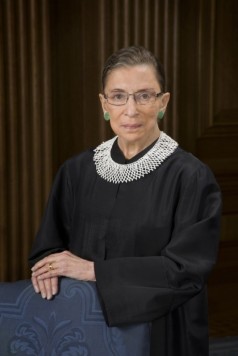The second match-up of the second round is between Ruth Bader Ginsburg and Belva Ann Lockwood. RBG took out Amy Klobuchar in Round 1, while Belva Ann Lockwood was our first underdog winner when she advanced past Supreme Court Justice Sonia Sotomayor. Which woman inspires you the most? You can vote by participating in our daily Twitter or Facebook poll, or by casting a vote at the Circulation Desk. Happy voting!

Ruth Bader Ginsburg-“Fight for the things that you care about, but do it in a way that will lead others to join you.”
Ruth Bader Ginsburg was the only surviving child of two Jewish immigrants and her mother encouraged Justice Ginsburg’s education from a very young age. After marrying and giving birth to her first child, Justice Ginsburg enrolled at Harvard University, where she was immediately introduced to and discouraged by the male views of her gender in the legal profession. After experiencing many forms of gender discrimination personally, including being told she would be paid less as a law professor because she had a husband with a decent job, Justice Ginsburg became one of the most well-known advocates and legal researchers for women’s rights. She argued several times successfully to the all-male Supreme Court of the United States and her successes as a whole discouraged legislatures from treating women and men differently. After serving as a judge on the U.S. Court of Appeals, President Clinton appointed Justice Ginsburg as the second female justice on the Supreme Court and the first female Jewish Justice. Justice Ginsburg used her position to continue the fight for women’s rights, upholding the Roe v. Wade decision and criticizing any legislation or cases that limited the ability of women to make their own decisions.

Belva Ann Lockwood-“If nations could only depend upon fair and impartial judgments in a world court of law, they would abandon the senseless, savage practice of war.”
At 14 years old, Belva was working as a school teacher. After getting married and being widowed in 1853, Belva decided she wanted a higher education to support herself and her daughter. Her decision was not popular, as it was extremely unusual for a widow to seek a higher education in those times. Belva remained determined despite her adversaries and by 1857 graduated from college with honors. She then became headmistress of a prestigious school. During these times, she became interested in the study of law. For the next few years, she would continue her studies while also working and realized that regardless of her position, she was often paid less and respected less than her male peers. Belva became active in women’s rights and opened a co-educational school for both genders. She was rejected from the Colombian Law School on the basis of her gender. Despite admittance to what is now the George Washington University Law School and completion of the coursework, she and other women at the school were denied diplomas. Belva wrote a directly to the current President of the United States asking for justice and within a week received her diploma. However, Belva’s struggles in the legal profession continued due to her remarriage and her gender. She struggled to keep up a practice and be accepted by other professionals. Despite support from some members of the profession, it took two applications before Belva became the first woman to be admitted to practice and argue in front of the United States Supreme Court. She eventually drafted legislation to promote women’s rights as individuals and continued to be active in the women’s rights movement. She ran for President of the United States in 1884 and 1888 for a third party. She eventually became a well-respected writer on the subject of women’s suffrage and property law reform.
Disclaimer: This is a friendly competition that is meant to increase awareness about some amazing women. The match ups were determined by a random outcome generator, and the winner will be determined based solely on the votes submitted by the participants. We are in no way seeking to pit one woman against each other in any inappropriate way, because each woman is inspiring in her own right.
